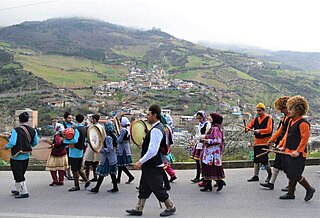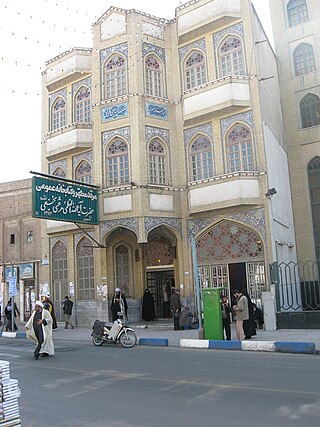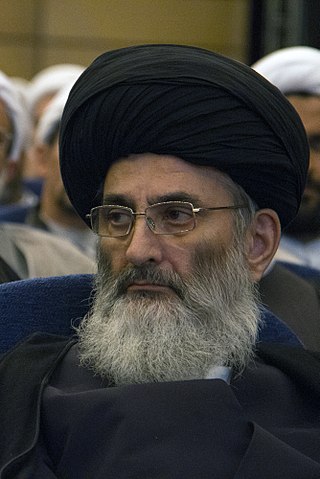Mahmud is a transliteration of the male Arabic given name محمود, common in most parts of the Islamic world. It comes from the Arabic triconsonantal root Ḥ-M-D, meaning praise, along with Muhammad.
In Shi'a Islam the guidance of clergy and keeping such a structure holds great importance. There are several branches of Shi'ism, of which Twelver Shi'ism is by far the largest, and each of the branches has different clergy structures. Individual clerics are referred to as mullā or ākhūnd, but since those terms have developed "a somewhat pejorative connotation" since at least the 1980s, the term rūḥānī has been "promoted" as an alternative, "especially by the clerical class itself".

The Shrine of Fatima Masumeh is located in Qom, which is considered by Twelver Shia Muslims to be the second most sacred city in Iran after Mashhad.

The Mazanderani people, also known as the Tabari people or Tabarestani people, are an Iranian people who are indigenous to the Caspian sea region of Iran. They are also referred to as Mazanis for short. They inhabit the southern coast of the Caspian Sea and are part of the historical region known as Tabaristan. The Alborz mountains mark the southern boundary of the area settled by the Mazanderani people.

Grand Ayatollah Shaikh Muhammad Hussain Najafi was a Pakistani Twelver Shia Marja. Muhammad Hussain Najafi was running a Hawza in Sargodha. Najafi was included in all the editions of "The Muslim 500: The World's Most Influential Muslims" since 2010. He is one of the nine marja's mentioned in the most recent edition.
Morashi, also Marashi, is a given name of Iranian origin meaning ‘happy-one’ possibly indicating ancestry from Ali al-Marash, the grandson of the fourth Shia imam, Ali ibn Husayn, also known as Zayn al-Abidin. The name is generally associated with a clan of Shi'ite Muslims who are descended from Ali ibn Husayn, who himself was a great-grandson of the Islamic prophet Muhammad. Today, about 2,000,000 members of the Marashi clan are mostly found in Iran, Türkie, Iraq, Syria, Kashmir and the UAE.
Shihab al-Din may refer to:
ʻAbd al-Karīm is a Muslim male given name and, in modern usage, also a surname. It is built from the Arabic words ʻabd and al-Karīm, one of the names of God in the Qur'an, which give rise to the Muslim theophoric names. It means "servant of the most Generous". It is rendered as Abdolkarim in Persian, Abdulkerim in Albania, Bosnia and Abdülkerim in Turkey.

Shahab ad-Din Muhammad Hussain Mar'ashi Najafi was an Iraqi Shia Grand Ayatollah and Marja'.

The Qom Seminary is the largest Islamic seminary (hawza) in Iran, established in 1922 by Grand Ayatollah Abdul-Karim Haeri Yazdi in Qom. It trains Usuli scholars.
Marashi is a village in Veys Rural District, Veys District, Bavi County, Khuzestan Province, Iran. At the 2006 census, its population was 79, in 12 families.

The Ayatollah Marashi Najafi Library, in Qom, is the third largest library in Iran, after the Central Library of Astan Quds Razavi, and the Library of Parliament, as well as being the world's third largest Islamic library, with more than 250,000 books, 25,000 of them online.

Sheikh Jafar ibn Hussein ibn Ali Shooshtari was a prominent Shia scholar from the city of Shooshtar.

Ayatollah al-Shaheed Sayyid Abū al-Fatḥ ʿIzz ad-Dīn Naṣrallāh ِal-Fāʾizī al-Mūsawī al-Ḥāʾirī, also known as Sayyid Nasrallah al-Haeri, was a senior Iraqi Shia jurist, teacher, poet, author and annalist.
Sadeq is an Arab and Iranian given name and surname which is most common in Iran, Pakistan, and Arab countries. Sadegh is the Iranian variant. Other variants include Sadiq. It is the adjective form of the root word [صدق] which means truthfulness, so it means truthful.

Mohammad Sadoughi known as "Sevomin-Shahide-Mehrab" is an Iranian Twelver Shia Ayatollah who was born in Yazd. He was a/the representative of Yazd people in the assembly of experts. He also was appointed the Imam of Friday Prayer in the city of Yazd by the decree of the former supreme leader of Iran, Seyyed Ruhollah Khomeini in 1980.

Grand Ayatollah Sayyid Muhammad-Husayn al-Husayni al-Marashi al-Shahrestanial-Haeri, known as al-Shahrestani al-Thani, was an Iranian-Iraqi Shia marja' and poet.

Mahmoud Mar'ashi Najafi or Seyyed Mahmoud Mar'ashi Najafi is an Iranian librarian, Bibliographer and manuscript expert. He is the director of Mar'ashi Najafi Library, which he says is one of the largest libraries in Iran and the world.
Muhammad-Amin al-Imami al-Khu'i, honorifically titled as Sadr al-Islam was an Iranian Ja'fari jurist and writer. An Azeri-Asadi by ancestry, Najafi by birth and Khoei by origin, he was recognized as a first-class mujtahid of Tehran from 1920 to the 1940s, and played an effective role in post-constitutional years. A well-known religious historian and author of many fiqh-related works in Arabic and Persian, however, most have remained as handwritten. In addition, Al-Khu'i was noticed as a book collector and scribe of rare books. He died in Tehran at the age of 63.










